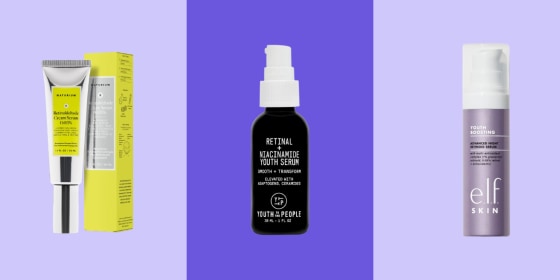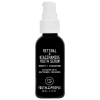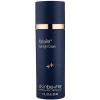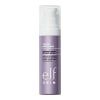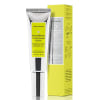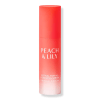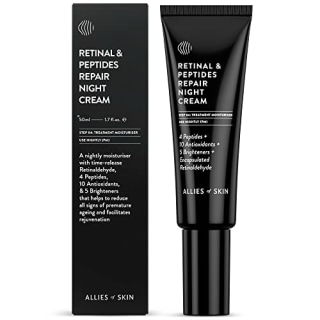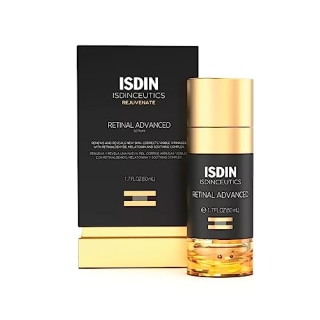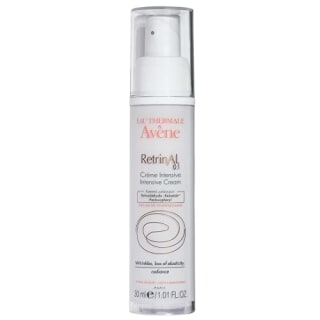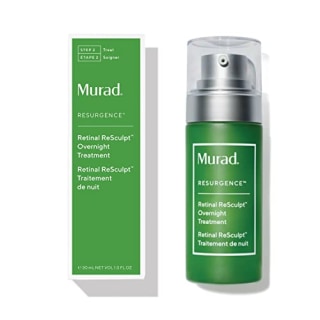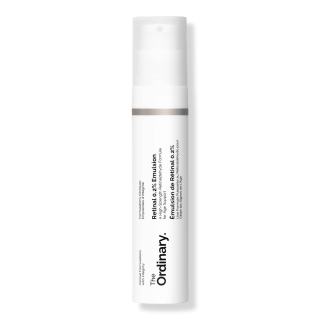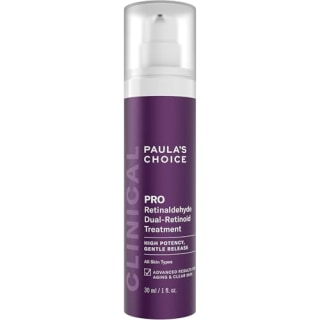Retinol is as close as it gets to a do-it-all topical skin care ingredient; dermatologists love its ability to boost skin cell turnover and spur the production of collagen (collagen being the fiber in skin that keeps it firm and smooth). Plus, it has ample data to back up its efficacy. But retinal, which belongs to a group of ingredients called retinoids (that also includes retinol), might be able to surpass it. Short for retinaldehyde, retinal is even more powerful than retinol, with the similar ability to smooth skin texture, clear breakouts, even out skin tone and soften fine lines and wrinkles.
Retinoids are vitamin A derivatives that you can use for acne, wrinkles and hyperpigmentation, says Dr. Gloria Lin, a board-certified dermatologist at Schweiger Dermatology in New York City. Some are only available by prescription (often bucketed under the term “retinoids”), while you can find other over-the-counter options at a lower strength, with retinal being the most potent of these, she says.
SKIP AHEAD How I picked the best retinal products | The best retinal products | What is retinal? | How to shop for retinal products | Why trust NBC Select?
How I picked the best retinal product
Retinal products can treat a variety of skin concerns like uneven texture and clogged pores, and can address discoloration, acne and wrinkles, according to our experts. When shopping for retinal products, they recommended considering the following factors:
- Concentration: The concentration of retinal can vary, with the lower end starting at 0.05% and going up to 1%.
- Additional ingredients: Retinal is often paired with soothing and moisturizing ingredients to offset any potential for dryness or irritation.
- Delivery system: Some retinal formulas are encapsulated, meaning it’s housed in a capsule that dissolves after you apply them to skin, which may reduce irritation at the skin’s surface and keep the ingredient stable.
Want more from NBC Select? Sign up for our newsletter, The Selection, and shop smarter.
The best retinal products
The right retinal product depends on your experience with retinoids, as well as your skin type. Below, we compiled expert-recommended face serums and creams that help improve wrinkles, fine lines, breakouts and more. All of the products listed are balanced with moisturizing ingredients, and many are fragrance-free to minimize the potential for irritation.
Best overall: Youth To The People Retinal + Niacinamide Youth Serum
- Improves dull skin
- Lightweight
- Reinforces skin barrier
- Higher price point
Both Jacobs and Lin consider this fragrance-free serum to be a good option for most skin types. Not only is it both vegan and cruelty-free, but “it contains 0.15% retinal along with niacinamide and ceramides to help nourish the skin,” says Lin. Together, these ingredients can improve fine lines and even out skin tone, according to the brand.
Best budget pick:E.l.f. Youth Busting Advanced Night Retinoid Serum
- Free of common irritants
- Smooths skin
- Reduces the look of fine lines
- Potent formula
Intended for overnight use, this face serum contains two retinoids: 1% granactive retinoid and 0.06% retinal. Dr. Michael Jacobs, MD, a board-certified dermatologist and clinical associate professor of dermatology at Weill-Cornell Medical College, likes this fragrance-free formula since it’s infused with hyaluronic acid for hydration, he says. It also has antioxidants to further help brighten skin, according to the brand.
Most versatile: Allies of Skin Retinal & Peptides Repair Night Cream
- Comes in two concentrations
- Smooths skin
- Improves tone and texture
- Higher price point
This fragrance-free night cream uses a patented and encapsulated form of retinal (at 0.05% concentration) alongside antioxidants, peptides and botanical oils. Jacobs likes this particular combination of ingredients since “it hydrates, protects and renews the skin all at once,” he says. Lin is also a fan of the product, saying “it is both gentle and goes on smoothly.”
Editor’s pick: Skinbetter Science AlphaRet Overnight Cream
- Fast acting
- Moisturizing
- Free of common irritants
- Higher price point
This product, which comes expert recommended in our guide to dermatologists’ skin care routines, pairs retinaldehyde with alpha hydroxy acids for a two-pronged approach to treating fine lines and dark spots, according to Dr. Julie Russak, board-certified dermatologist in New York City. “It offers the benefits of both exfoliation and retinal, making it a standout choice for addressing multiple skin concerns in one formula,” she says. I’ve also personally found it to help control my hormonal breakouts while smoothing the texture of my skin, making it a must-have in my own routine.
Best splurge:Isdin Retinal Advanced Dual-Phase Night Serum
- Suitable for all skin types
- Gentle formula
- Improves tone and texture
- Most expensive on our list
- Not pregnancy-safe
Russak recommends this night serum as a great option for those who want to target fine lines and wrinkles. “When introduced gradually into your evening routine, it aims to reveal smoother and revitalized skin,” she says. It also has a proprietary soothing complex, which includes niacinamide, to keep skin calm and hydrated, according to the brand.
Most gentle:Peach & Lily Retinal for All Renewing Serum
- Reduces dark spots
- Suitable for all skin types
- Helps the skin barrier
- Nothing to note at this time
Lin likes this Korean skin care brand, which she says focuses on gentle ingredients and preventative care. What makes this serum especially great, according to Lin, is the 0.1% retinal as well as ceramides and ectoin, which research has found to prevent inflammation caused by retinoids. I
Best for beginners:Naturium Retinaldehyde Cream Serum 0.05%
- Improves tone and texture
- Firms the skin
- Reduces the look of fine lines
- Nothing to note at this time
Since this serum has a relatively low concentration of 0.05% retinal, it’s beginner-friendly, says Lin. Plus, because of its unique cream serum texture, it is easy to apply, she says. The retinal is encapsulated to ensure it doesn’t break down (and thus lose efficacy) while en route to skin’s deeper layers, according to the brand. The fragrance-free formula also contains vitamin E and apricot kernel oil to moisturize skin.
Best for sensitive skin:Avène Retrinal 0.1 Intensive Cream
- Plumps skin
- Has antioxidant protection
- Improves deep fine lines
- Higher price point
Lin likes this cream not only because it comes in two strengths (0.05% and 0.1%), allowing users to graduate to a higher percentage as their skin adjusts, but also because it’s fragrance-free, which she says may be better for sensitive skin types. Plus, it is formulated with thermal spring water to help reduce the irritation, along with vitamin E and peptides to soothe and brighten skin, she says.
Best for mature skin:Murad Retinal ReSculpt Overnight Treatment
- Improves deep fine lines
- Moisturizing
- Available in multiple sizes
- Potent formula
Designed to target sagging and deep wrinkles, this serum uses an encapsulated form of retinal as well as oat lipids and alpha glucan (to moisturize) and botanical ingredients, including kangaroo paw flower and olive leaf extract (to improve saggy skin). It can also be used on the neck to help lift and smooth sagging skin, according to the brand. It has a 4.9-star average rating from over 600 reviews on Sephora.
Best for dull skin: The Ordinary Retinal 0.2% Emulsion
- Lower price point
- Improves skin luminosity
- Reduces the look of fine lines
- Potent formula
- Can leave slight color residue
This serum-like retinal, which has a 4.3-star average rating from over 900 reviews at Ulta, combats fine lines and the loss of firmness and elasticity, according to the brand. Reviewers say, their skin has a brighter appearance, smoother texture and a more even tone (including the fading of dark spots) after consistent nightly use. Plus, they appreciate that the serum doesn’t cause any dryness, discomfort or tightness in their skin.
Best for acne-prone skin: Paula’s Choice Pro Retinaldehyde Dual-Retinoid Treatment
- Gentle release formula
- Clears skin
- Suitable for all skin types
- Not pregnancy-safe
This creamy overnight treatment is excellent for those looking to decrease fine lines, enlarged pores, dark spots, uneven tone and texture, according to the brand. Besides retinaldehyde, it also has jojoba seed oil and adapinoid (an oil-soluble retinoid) to soothe the skin and combat acne triggers. You can use this with your nighttime moisturizer or apply it before your moisturizer to minimize potential dryness and irritation, according to Paula’s Choice. It has a 4.9-star average rating from over 580 reviews at Sephora.
What is retinal?
Retinal, or retinaldehyde, is a derivative of vitamin A and delivers results more quickly than retinol (as well as other over-the-counter retinoids). It “is considered the most effective retinoid in over-the-counter [skin care products],” says Jacobs.
Because it’s weaker than prescription-level retinoids, “retinal is a good option though for those who cannot tolerate the prescription tretinoin, but want to see more benefits than with just plain retinol,” says Lin. (Tretinoin is a form of retinoic acid, which makes it more powerful and therefore only available with a prescription.) Additionally, it’s easier to access, as it doesn’t require a trip to the dermatologist.
Finally, retinal also offers a middle ground for those looking to amplify the benefits of their retinoid. “Some people may want to work their way up from retinol to retinal and then to a prescription tretinoin depending on their skin type,” says Lin. It can be a way to step up your skin care regimen over time.
How to shop for retinal products
When searching for retinal products, our experts advise looking at the concentration. “Start with a lower concentration of retinal and gradually increase usage as your skin adjusts,” says Russak. That’s because retinoids, in both prescription and over-the-counter products, can leave skin dry, flaky or irritated.
Your skin type and your history with retinoids can help guide you to the right concentration of retinal. On the lower end, you may find concentrations around 0.05%, while higher strengths have up to 0.1% retinal. If your skin is naturally dry or sensitive, consider trying a retinol first, since it’s less powerful than retinal. If you can tolerate that, then you could move up to the lower strength retinal, says Lin. Meanwhile, if you have more oily skin, you can potentially start with a higher strength retinal, like 0.1%, and then increase it over time (or move up to a prescription-level retinoid) if tolerated, she says. The same goes for those who are currently using retinol without any side effects.
That said, individual tolerability can vary, and some people may still experience sensitivity or irritation when using retinal, says Russak. The formulation can also play a role; some ingredients, such as hyaluronic acid and ceramides (that are both hydrating), can help balance the inherent drying properties of retinal. Plus certain technologies — such as encapsulating the retinal — can also minimize side effects. Research shows that encapsulation, which slowly releases the retinal over time, is a good way to keep retinal stable and avoid irritation.
Meet our experts
At Select, we work with experts who have specialized knowledge and authority based on relevant training and/or experience. We also take steps to ensure all expert advice and recommendations are made independently and without undisclosed financial conflicts of interest.
- Dr. Gloria Lin, MD, FAAD, is dermatologist with the Schweiger Dermatology Group in New York City. She has special interests in the treatment of skin cancer, psoriasis and atopic dermatitis among others.
- Dr. Michael Jacobs, MD, is a board-certified dermatologist and clinical associate professor of dermatology at Weill-Cornell Medical College. In addition to practicing both medical and cosmetic dermatology, his research interests include the treatment of melanoma.
- Dr. Julie Russak, MD, FAAD, is a board-certified dermatologist and assistant clinical professor of dermatology at Mount Sinai Hospital.
Why trust NBC Select?
I am a freelance beauty writer and editor who has been covering beauty and health for more than a decade, including topics like skin care ingredients and sun protection. For this article, I spoke to three dermatologists to narrow down the retinal products to shop this year, and highlighted their recommendations for the best options to consider.
Catch up on NBC Select’s in-depth coverage of personal finance, tech and tools, wellness and more, and follow us on Facebook, Instagram, Twitter and TikTok to stay up to date.
